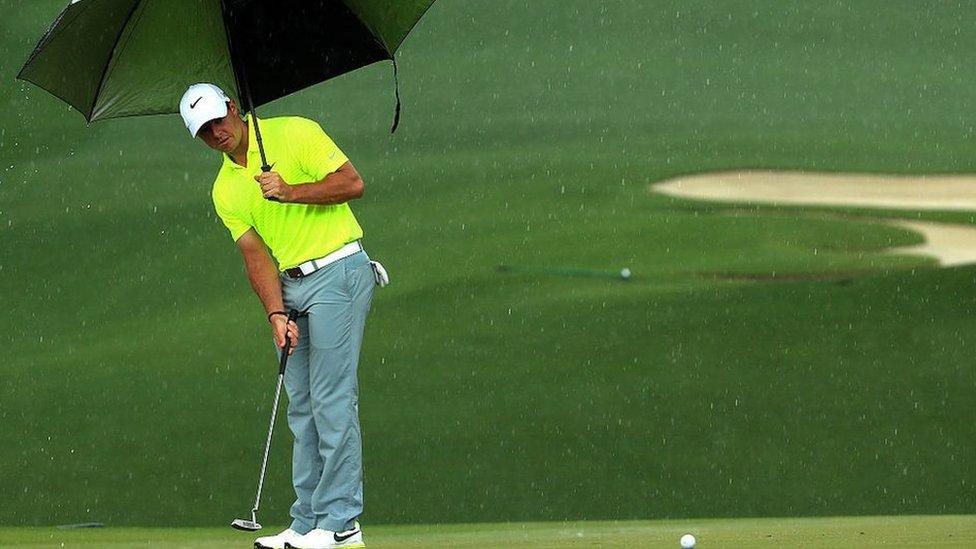The Open 2019: How the weather could swing the contest
- Published

The golfers will be hoping for perfect weather conditions ahead of The Open getting underway
The Open is on its way to Portrush - and while the quality of golf is guaranteed, the Northern Ireland weather can't always be relied upon.
So what conditions might have an impact on Tiger and Rory when they're on the greens?
Well, being near the sea, the course could be susceptible to a bit of fog. Along with lightning, that's the weather type most likely to cause delays or suspensions.
However a 'wee bit of weather' always makes a match more of a challenge. Wind, rain, temperature and humidity all affect competitors and their equipment. And it may even influence the choice of clubs players use.
So how could the conditions on the north coast influence the tournament?

South African golfer, Louis Oosthuizen, felt the cold when playing in the 2016 Alfred Dunhill Links Championship in Scotland
Temperature
Lower temperatures will affect the distance a golf ball travels. When the ball and club are colder, the transfer of energy is not as efficient, so the ball speed is slower.
Colder air is denser than warm air, so there is more friction and drag. The same can be said about the human body. Muscles are more flexible and responsive when the temperature is warm than when it's cold, so we are able to move more efficiently.

Rory McIlroy got some practice golfing in the rain at the 2015 Masters Tournament but will he be doing the same in Portrush?
Rain
Most golf courses will absorb rainwater, but heavy downpours will change the texture and consistency of the ground. And wet weather means slippy clubs and slippy shoes, so golfers will need to check their grip!
The ball runs more slowly on wet grounds, and it may even roll to a halt on saturated fairways. The dimples of a golf ball can also fill up with water, making clean contact more difficult, and the ball to slip on impact. Water, mud and dirt can fill the grooves of a golf club, compromising the amount of backspin, flight and distance that it produces.
Of course, excess water on the course can result in flooding and this will require a judgement call depending on whether adjustments can be made or not.

Daniel Brooks was up against the wind at the 2015 Scottish Open
Wind
The higher you hit the golf ball the more wind will affect its flight. Wind has a much greater effect on the golf ball when hitting into it than with it. The wind direction - and sudden wind gusts - can be much harder to predict at a links course due to the curves and indents of the coast.

Fog caused issues at the 2007 Madeira Islands Open in Portugal
Humidity and fog
Obviously if visibility is poor, there is a problem for golfers. Professional players hit the ball at well over 100mph and if they can't see clearly, the ball can become a flying missile. High humidity can cause banks of mist or a very low ceiling of cloud.